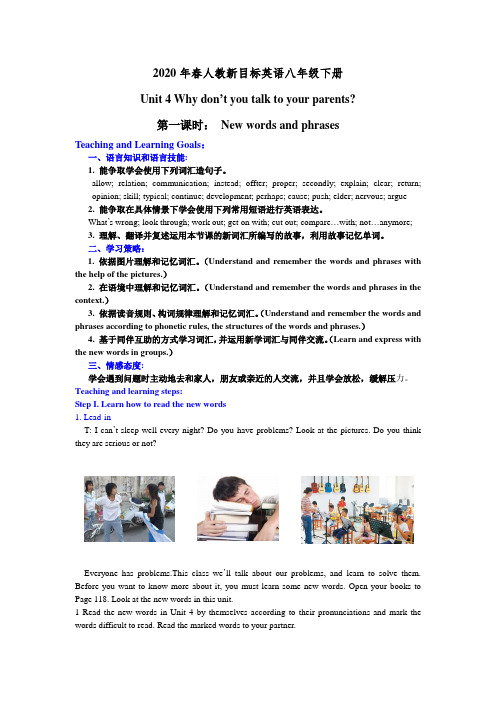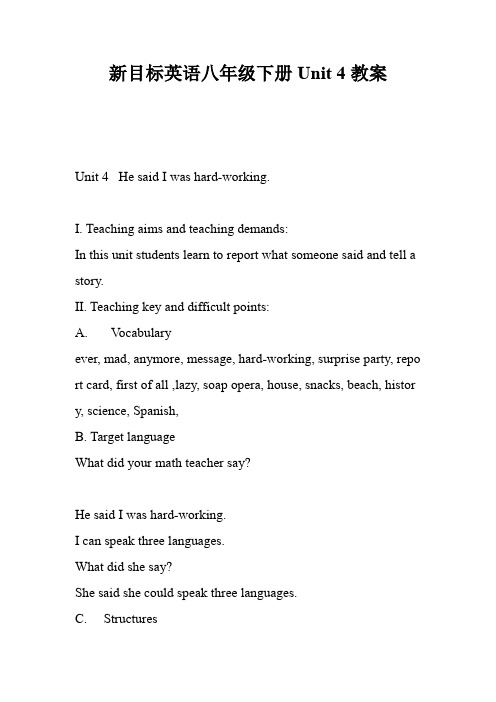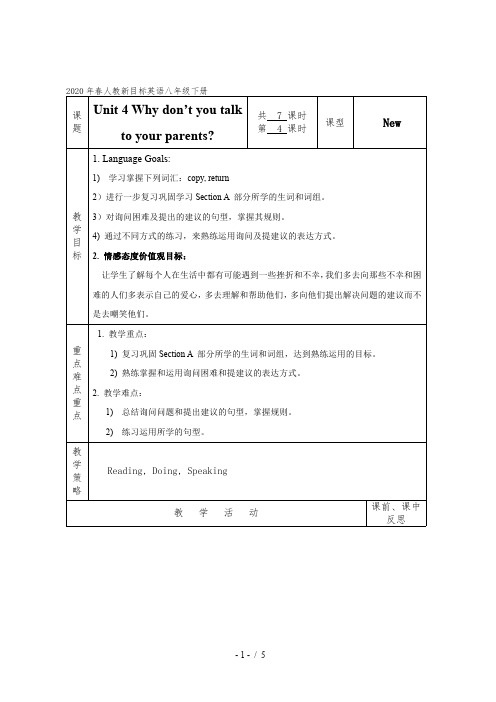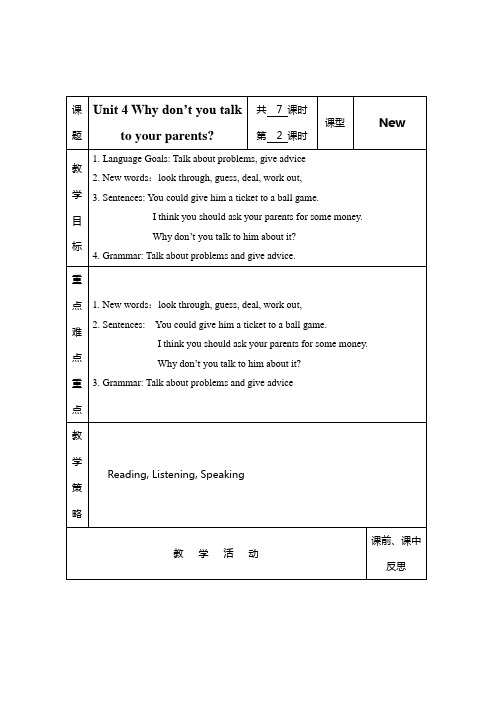2020年春人教新目标英语八年级下册Unit4全单元教案设计
2020年春人教新目标英语八年级下册Unit4第一课时教案

_____⑶worries about things at home,school orworkc.找出两者之间的不同点
_____⑷usual or commond.体育锻炼和技巧练习
_____⑸try to be the first to finish sthe.寻常的或不同的
而在本节课中我运用图式理论呈现词汇这一呈现方式让学生不断地丰富与完善已有的图式并通过已有图式更好地理解与记忆新词汇而且提高学生对词汇学习的趣味性并在此基础上增强词汇教学效果2
2020年春人教新目标英语八年级下册
Unit4Why don’t you talk to your parents?
第一课时:New wordsand phrases
Step II. Learn how to memorize the new words and phrases
1. Remember the words and phrases according to the pictures.
communicatev.沟通
They arecommunicatingintheoffice.
1 Read the new words in Unit 4by themselves according to their pronunciations and mark the words difficult to read. Read the marked words to your partner.
三、情感态度:
学会遇到问题时主动地去和家人,朋友或亲近的人交流,并且学会放松,缓解压力。
新目标英语八年级下册Unit 4教案

新目标英语八年级下册Unit 4教案Unit 4 He said I was hard-working.I. Teaching aims and teaching demands:In this unit students learn to report what someone said and tell a story.II. Teaching key and difficult points:A. V ocabularyever, mad, anymore, message, hard-working, surprise party, repo rt card, first of all ,lazy, soap opera, house, snacks, beach, histor y, science, Spanish,B. Target languageWhat did your math teacher say?He said I was hard-working.I can speak three languages.What did she say?She said she could speak three languages.C. StructuresReported speechSimple past tenseCan for abilityIII. Teaching methods: Audio-lingual methodsIV. Teaching aids: a tape recorderV. This unit is divided into eight periods.Lesson 1 Speak and listenSection A 1a---1cI. Teaching aims and demands:Students learn to report what someone said.II. Teaching key and difficult points:A. V ocabularysoap opera, surprise party, be mad at, on Friday night,B. Target languageWhat did she say? She said she was having a surprise party for Lana on Friday night.Did you ever watch soap opera?What are some things happened on soap opera?III. Teaching methods: Audio-lingual methodsIV. Teaching aids: a tape recorderV. Teaching procedureActivity 1. RevisionTask 1. DictationTask 2. Ask and answer.Questions about the past progressive.Activity 2. PresentationThis activity introduces some new vocabulary and provide oral practice using the target language.Task 1 . Ask four students to stand in front of the class, and the t eacher asks them the following questions as a reporter.1. What are you going to do when you grow up?2. What are you going to do next week?3. What are going to do after school?The students will give different answers, then ask a good student to report what they said.I am going to e a doctor.What did she say?----------She said she was going to be a doctor.I am going to have a party on Friday night.What did he say?-------He said he was going to have a party on Friday night.I am going to do my homework.What did she say ?------ She said she was going to do her home work.I am going home after school.What did she say?-----She said she was going home after school. Say In this unit we are going to learn to use words like to report what someone said.Task 2. Read the instructions. Then ask a student to read the four questions. And write the words on the Bb. Explain what soap op era is.Task 3. Ask the students to Look at the pictures, point out the T V screens in the picture. Ask one girl to read what Marcia said. What did Marcia say? She said She said she was having a surpri se party for Lana on Friday night. Repeat the other pictures in the same way.Activity3. Listen and number the pictures in activity 1a.Task 1. Play the recording the first time. Students only listen. Task 2. Play the recording a second time. Students number the pi ctures. Then check the answers.Activity 4. PairworkAsk the students to ask and answer about what the people in the soap opera said.Homework1. Make up your own conversations.2. Write down the sentences in 1a.Lesson 2 Listen and speakSection A 2a---Grammar FocusI. Teaching aims and demands :Students learn to report what someone said.II. Teaching key and difficult points:A. V ocabularya surprise party, be mad at, not… anymore, bring …to , happen ( on), Direct Speech, Indirect Speech.B. Target languageBen told Lana that Marcia was going to have a surprise party for her.She said she was mad at Marcia.He told me he would call me tomorrow / the next day.She said she could speak three languages.III. Teaching methods: Audio-lingual methods and PPPIV. Teaching aids: a tape recorderprocedureActivity 1. RevisionTask1. Check the homework. Ask and answer.I am a student.What did he say?-----He said he was a student.I can swim.What did she say ?------She said she could swim.I will ring you up tomorrow.What did she say?She told me she would ring me up.Activity 2. Listening and circling .the instructions. Learn the key vocabulary.to the five sentences and ask different students to read them to t he class. Then say: You will hear a conversation between two pe ople who are talking about a soap opera on True or false after each statement.Play the recording twice and students circle their answers. Then check the answers.ActivityTask 1. Read the instructions.Task 2. Play the recording again and check the answers. Activity 4. GroupworkTask the instructions for the activity.Task 2. Point to the pictures in activity the students to use the w ords and pictures as they have their conversations.Task 3. Have the students work in pairs.Task 4. Check the answers by calling on different pairs to say a conversation to the class.Activity 5. Grammar FocusReview the grammar the students to say the statements.Pay attention to the following:Direct speech Indirect speecham, is , am having, go, will, can was , was having, would , co uld, wenta present situation a past situationWhen you report what someone said, you use words that talk ab out the past.Homework1. Review the conversation and the vocabulary.2. Write the sentences in grammar focus.。
2020年春人教新目标英语八年级下册unit4第四课时教案 (1)

1. 教学重点:
重
1) 复习巩固 Section A 部分所学的生词和词组,达到熟练运用的目标。
点
难
2) 熟练掌握和运用询问困难和提建议的表达方式。
点 2. 教学难点:
重
点
1) 总结询问问题和提出建议的句型,掌握规则。
2) 练习运用所学的句型。
教 学
Reading, Doing, Speaking 策 略
He _____ _____ _____ his friends ____ ___ he can say he’s sorry.
⑥ 或许你应当去他家。
_______ you ______ go to his house.
⑦ 我想我可以,但是我不想让他吃惊。
I think I _______, but I don’t want to _______ _________.
-2- / 5
① 你看上去很疲劳,怎么了?
You ____ tired. What’s _____ _______?
② 昨晚,我一直学习到午夜,因此我没有睡足觉。
I studied _____ _________ last night so I didn’t ___ ______ sleep.
③ 我应该做什么? ________ ____I do?
2020 年春人教新目标英语八年级下册
课 Unit 4 Why don’t you talk 共 7 课时
课型
题
to your parents?
第 4 课时
New
1. Language Goals:
1) 学习掌握下列词汇:copy, return
2)进行一步复习巩固学习 Section A 部分所学的生词和词组。
2020年春人教新目标英语八年级下册unit4全单元教案

2020年春人教新目标英语八年级下册Unit 4 Why don’t you talk to your parents?【Knowledge aims】1.Grammer1)Can use could and should .Express advice and persuasion.2)Use “Why don’t you …?”correctly to give advice.3)Use conjunctions:until,so that,although correctly.2.Words and expressions1)allow, guess, argue, offer, communicate, explain, copy,return, compete, continue, compare,push,cause, deal, relation, communication,cloud, member, pressure, opinion,skill, football, development, wrong, elder, nervous, proper, clear, typical, quick, crazy, usual, instead, secondly, anymore, perhaps,whatever2)look through, big deal, work out, get on with, cut out,compare…with ,in one’s opinion 【Ability aims】1)Can ask and state own and other problems2)Can give advice【Strategies】1)Find the expressions that have the same meaning and understand the meaning in thecontext.2)Guess the meaning in the context.【Culture】Opinions about taking after-school classes in eastern and weatern countriesThe first period 1a~2d1aTo introduce Ss to the first unit goal:talk about problems.To set the scene, increase Ss’vocabulary and introduce the target language.Let Ss talk about the problems in their life.Lead Ss to go through 1a.learn the word and expressions .After learning ,T gives advice.1bListen and circle the problems you hear in 1a.Repeat it after the tape.It is helpful to finish 1c1cSs read the conversations together and make a new one in groups .Then act out the conversation.2a and 2bTell Ss the main idea and introduce some key words.Listen to finish 2a and 2bRepeat it after the tapeNote the words and phrases.2cRole-play a conversation between Peter and his friend.First in group.Then act out.2dRole-play the conversation.First repeat after the tape and underline the words and expressions they don’t know.T explain them to Ss.Then practice and act out the conversation.【Homework】Remember the new words and expressions .prepare the performance for tomorrow.The second period 3a~3cStep1 Revision1. Role play the conversation in 2d2. Talk about the problems and give adviceStep2 Presentation1.Tell Ss what we learned in this unit.Ask them what problems they have in their family andhow they solve them.When there are some problems at home, what do you do as a kid?2.Ask Ss to look at the picture and talk about it .T can give some key words during this step.Forexample,fight a lot,get on with.3.Introduce the article is a letter. Pay attention to the style. And we can get what kind ofinformation from the style.4.Give questions and ask Ss to read and find out the answer.Ss must have enough time to do it.So T is patient to wait for them to find the keys.5.Ask different students to ask and answer the problems and advice.It can be made into somesmall conversations.A:I can’t get on well with my family.What should I do ?B: You should talk about these feelings with his family.6.T play the tape and ask Ss to repeat. When they read, they should underline the new wordsand expressions they don’t know.7.T explain the words and expressions to Ss. Practice them with Ss8.Read and translate the two letters in group. T give help if they need.Step3.DiscussionAsk Ss if they agree /disagree with his advice and why.Step4.Practice3c Which words or phrases in the letters have the same or similar meanings as the following? Write a sentence using each word or phrase.Because my Ss have poor English, it’s better to lead Ss to do it together. Then T write Ss’ answer on the Bb.Step5.HomeworkRewrite the two letter in a short passage.Try to recite the letters.Remember the words and phrases and T check them in class.The third period Grammar Focus~SectionB1eStep1 Revision1.check the words and the expressions on Page 27.2.Encourage Ss to recite or retell the article.Step2 Presentation and practice1,Grammar focusSs read it and translate it in group.T gives help when they work in group.Then T can have a check about it.2.4aExpain the use of although, so that and until.Prompt Ss to suggest what these words mean and what they are used for.T can help Ss to make sentences with these words.◆Although is used to join wro parts of a sentence and it shows a contrast between the ideas inthe two parts.◆So that is used to introduce a reason for what is stated in the earlier part of a sentence.◆Until is used to show that an action continues up to a certain time and stops at that time,4b.Tell Ss some problems and ask them what advice they can give.It’s better to write down Ss’answer on the Bb.4cT show these problems to students and discuss them together how to solve the problems. Sometimes Ss can give some perfect responses.Rmind Ss to use the target language to talk about problems and give advice.Section B1a and 1bAsk Ss how to lower stress .Make a list of activities on the Bb. T also can make a survey about the activities in 1a.1cLead Ss to look through the sentences .read and translate them to make sure they understand their meaning .At the same time Ss can get a main idea about the listening material.T can make it a small conversartion about each stress.Listen to check the problems.1dBefore listening , T can ask Ss to make a guess to fill in the blanks by using the contextual clues. After listening, Ss repeat the conversation.1eSs practice speaking the target language by talking about the problems and advice.Step 3 HomeworkMemorize the Grammar FocusTalk about the stress and the way to solve it.Write it down as a composition.The fourth period 2a~2bStep 1 RevisionCheck the words and the phrases.Talk about the problems and give advice.Step 2.Presentation2aGo through the activities and check the ones the Ss do2b1)Ss scan the intructions and the two questions in 2b and predict the main idea to make sure thepurpose of the first reading.2)Ss read the text and say the main idea. If Ss have difficuly, T can provide some pharses for Ssto choose, Then let Ss express the main idea by using the whole sentences3)Ask Ss to read the text carefully. Find the points they can’t understand.Exam skills, so that, in order to , compete, typical, on most days after school, football training, cut out, the tired children don’t get home until after 7:00pm.,have a quick dinner, It’s time for homework,continue, compare…with…, crazy, push their kids hard, development, cause a lot of stress, even.T explain the keys to Ss and practice them with Ss.4)Ss repeat the text after the tape.Step3 HomeworkRetell the storyThe fifth period 2c~self checkStep1.RevesionRetell the textStep 2.Presentation and practice1)Read the passage again and find the words that have the same meaning as the explanation.Sscan do it with T.2)Read it again anf answer the questions in 2b and 2d.T can provide some other questions tocheck Ss understanding.3)Divide Ss into some groups and discuss the questions in 2e.They try to use the targetlanguage in the conversation.T can write the target language on the Bb so that Ss can use them freely.3a~3b1)Read the instruction and parents’ opinion.Know about the purpose of the activity.2)Discuss in group and report to the class.3)Lead Ss to write the composition. Before writing, T lead them to revise the words andphrases about the topic. Ask some students to read their work.Self check1)It is used to check if Ss can use the conjunctions well.First, do them individually, then checkthe answer.2)Ss exchange their ideas and report their ideas.Step 3 HomeworkWrite a composition about 3b.。
人教版新目标8下Unit 4全单元教案

Unit 4 Why don’t you talk to your parents?Period 1 Section A 1a-2d【导学目标】1.Master the key words and sentences:(1) Key words:allow, wrong, guess, deal, write him a letter,talk about, look through, work out (2)Sentences:Why don’t you talk to your parents?My parents don’t allow me to hang out with my friends.Hope things work out..2.Learn to talk about abilities.Ⅱ. Teaching Key Points and Difficult Points1.Talk about problems..2.Give advice.【导学过程】Step1.Lead-in (3 minutes)Brain stormingT:Do you have any problem in your daily life?S:...T:How do you solve them? Give some advice.S:...Step 2.Presentation: look and say (5 minutes)1. Show some pictures and teach the new words and sentences.2.Let the students read the new words and remember them.3.Have a chant to consolidate the new words.Step 3.Activity 1a(5 minutes)1.Have students look at the pictures in Part 1a on the screen.Start by asking students to look at the problems.2. Pair work.Have you ever met any problems above?How do you solve them?Step 4. Activity 1c (4 minutes)Look at the problems in 1a and make conversations.Step 5.Activity 1b (3 minutes)Listen and circle the problems you hear in 1a.Step 6.Pair work (5 minutes)Choose one picture and make a conversation.A: What’s wrong?B: I’m really tired because I studied until midnight last night.A: Why don’t you go to sleep earlier this evening?Step 7.Activity 2a&2b (10 minutes)1.Get the students have a quick look at the instructions of these two activities,so they can know how to do them.2.Then play the recording the first time for the first time to fill in the blanks in 2a.3.Listen again. Why doesn’t Peter like his friend’s advice? Write the letters (a-e) next to the advice in 2a.4.Check the answers.Step 8. Activity 2c (3 minutes)Role-play a conversation between Peter and his friend.A: What’s the matter, Peter?B: I had a fight with my best friend. What should I do?A: Well, you should call him so that you can say you’re sorry.Step 9. Activity 2d (5 minutes)1. Listen to the tape and answer the questions:(1)What's wrong with Kim?(2)Does Dave give advice to Kim?What should Kim do?2.Read after the tape,pay attention to the pronunciation and intonation.3.Role play the conversation.4.Explain some language points.Step 10. Summary (2 minutes)Let the students think about what we have learned in the period.Step 11. Exercises (7 minutes)Let the students finish the exercises to consolidate what we have learned today. 【探究归纳】1.too much和much too的区别:在too much中too修饰much, 表示程度, 它们修饰不可数名词;而在much too中, 是much修饰too, 在句中修饰形容词或副词, 意为“太,非常”。
新目标八年级英语下册UNIT4教学设计

新目标八年级英语下册UNIT4教学设计第一篇:新目标八年级英语下册UNIT 4教学设计一、教学内容及分析本单元的教材设置从谈论电视剧剧情开始,以对话的形式引出直接引语和间接引语的应用及转换。
通过谈论和学生年龄相仿的电视剧人物,把枯燥的语法知识学习融入情境对话之中,学习如何用英语转述他人的话,学习内容贴近生活,学生学习兴趣高涨。
教学内容安排采用听、说读写结合的方法,让学生在听力、口语阅读、写作练习中,学习新的语法知识,形成正确的语言习惯,提高英语运用能力.二、学习者特征分析: 学生已经学习了一般现在时,一般过去时,现在进行时,过去进行时等时态,能够进行各种时态之间的转换,同时,学生对各种时态的陈述语气也知道怎么变化,因此在学习本单元就容易的多了。
三、单元整体目标分四、重点、难点本单元的教学重点是让学生学会何用英语转述他人的语,了解直接引语、间接引语,学会直接引语转换为间接引语。
本单元的教学难点是把直接引语转换间接引语的转换中,注意动词的时态变化和人称代词的变化,并能口头、笔头上正确运用英语转述他人的观点。
六、课时及教学内容安排教学内容课时安排教法选择教学评价period 1ppt通过让学生转述检查是否掌握,注重过程评价period 2tbl,mit,通过转述电视剧的情景和听力训练,进行过程评价period 3stereo通过转述成绩单正确对待老师的评价period 4 tbl通过写作训练学会书面表达与同学互通情感readingperiod 5pre—reading post--reading ppt通过渗透阅读策略和情感态度,进行过程评价教学内容课时period 1教学对象八年级学生提供者一、教材内容分析二、教学目标(知识,能力,情感态度、价值观)知识目标能力目标能将直接引语是陈述句,一般疑问句,特殊疑问句和祈使句,正确的转述为间接引语,同时注意直接引语是客观真理的情况,特别注意指示代词,人称代词等的变化。
2020年春人教新目标英语八年级下册unit4第二课时教案设计

B: You could …
课后反思
T:Peter has some problems. What advice does his friend give him? Fill in the blanks withcouldorshould.
1. Let Ss read the sentences in2a.
2. Play the recording for the Ss to listen and write the words in the blank.
迈克自己算出了那道难题。
Is it possible to work out the problem?有可能解决这个问题吗?
HБайду номын сангаасmework:
Write three conversations about your problems and your friends’ suggestions.
A: I have too many after-school classes.
Step2Pair work
1. Tell Ss to make a conversation using the information in2aand 2b.
2. Let one pair to read out their conversation first.
3. e.g. A: What’s the matter, Peter?
Why don’t you talk to him about it?
3. Grammar: Talk about problems and give advice
教学策略
Reading,Listening,Speaking
2020年春人教新目标英语八年级下册第四单元教案

八年级295/306班英语科备课教师备课时间【单元内容】Unit 4 Why don’t you talk to your parents?【课标要求】1.能听懂有关描述问题的短语;能听懂用could和should提建议的方式;能听懂合理的建议。
2.会描述遇到的问题并寻求帮助;能合理、恰当地给别人提出建议,帮助他人解决问题。
3.正确读出本单元所学内容,正确表达自己和他人的现实生活情况。
4.会根据自己遇到的问题寻求帮助;会在日常生活中恰当理解他人的问题和有效地表达自己的建议。
【学习内容分析】(分析知识点在知识体系中的地位和作用;分析知识的应用价值;分析知识对学生的情感熏陶及能力、思维培养上的作用)本单元围绕 problems和 advice的话题展开,集中呈现了大量情态动词和until, so that, although引导的状语从句的用法,通过本单元的学习,让学生明白情态动词的重要性,在以后的学习生活中注意提出建议。
主要让学生掌握情态动词的正确用法,学会谈论如何提出建议。
Section A重点是学习情态动词和建议的表达法,学会用不同句式提出建议。
本部分难点是情态动词的选择。
Grammar Focus部分以表格的形式罗列了如何提出合理建议的典型句型,为学生操练提供了示范,该部分还呈现了表示建议的句型,提高表示建议的单词的用法要求并增加更加丰富的表达形式。
Section B主要围绕“或许你应该学会放松”这一话题继续渗透情态动词的相关用法。
本部分在Section A的基础上,通过简单的建议过渡到了如何学会放松自己这一话题。
通过听、说、读、写等活动,引导学生学习更多表达建议的句式结构,培养自我放松、自我提建议的意识。
Self Check部分检测学生对各种建议及对转折连词的运用,培养语块意识,总结本单元语块的搭配。
【学情分析】(分析知识生成点及新旧知识的关联,预设学生学习困难)总的来说,对于初二的学生,一方面由于环境已熟悉,另一方面随着年龄逐渐增大,青春期的到来,因此会更叛逆,更爱玩儿,因此,激发学生兴趣很重要。
- 1、下载文档前请自行甄别文档内容的完整性,平台不提供额外的编辑、内容补充、找答案等附加服务。
- 2、"仅部分预览"的文档,不可在线预览部分如存在完整性等问题,可反馈申请退款(可完整预览的文档不适用该条件!)。
- 3、如文档侵犯您的权益,请联系客服反馈,我们会尽快为您处理(人工客服工作时间:9:00-18:30)。
2020年春人教新目标英语八年级下册Unit 4 Why don’t you talk to your parents?【Knowledge aims】1.Grammar1)Can use could and should .Express advice and persuasion.2)Use “Why don’t you …?”correctly to give advice.3)Use conjunctions:until,so that,although correctly.2.Words and expressions1)allow, guess, argue, offer, communicate, explain, copy,return, compete, continue, compare,push,cause, deal, relation, communication,cloud, member, pressure, opinion,skill, football, development, wrong, elder, nervous, proper, clear, typical, quick, crazy, usual, instead, secondly, anymore, perhaps,whatever2)look through, big deal, work out, get on with, cut out,compare…with ,in one’s opinion 【Ability aims】1)Can ask and state own and other problems2)Can give advice【Strategies】1)Find the expressions that have the same meaning and understand the meaning in thecontext.2)Guess the meaning in the context.【Culture】Opinions about taking after-school classes in eastern and weatern countriesThe first period 1a~2d1aTo introduce Ss to the first unit goal:talk about problems.To set the scene, increase Ss’vocabulary and introduce the target language.Let Ss talk about the problems in their life.Lead Ss to go through 1a.learn the word and expressions .After learning ,T gives advice.1bListen and circle the problems you hear in 1a.Repeat it after the tape.It is helpful to finish 1c1cSs read the conversations together and make a new one in groups .Then act out the conversation.2a and 2bTell Ss the main idea and introduce some key words.Listen to finish 2a and 2bRepeat it after the tapeNote the words and phrases.2cRole-play a conversation between Peter and his friend.First in group.Then act out.2dRole-play the conversation.First repeat after the tape and underline the words and expressions they don’t know.T explain them to Ss.Then practice and act out the conversation.【Homework】Remember the new words and expressions .prepare the performance for tomorrow.The second period 3a~3cStep1 Revision1. Role play the conversation in 2d2. Talk about the problems and give adviceStep2 Presentation1.Tell Ss what we learned in this unit.Ask them what problems they have in their family andhow they solve them.When there are some problems at home, what do you do as a kid?2.Ask Ss to look at the picture and talk about it .T can give some key words during this step.Forexample,fight a lot,get on with.3.Introduce the article is a letter. Pay attention to the style. And we can get what kind ofinformation from the style.4.Give questions and ask Ss to read and find out the answer.Ss must have enough time to do it.So T is patient to wait for them to find the keys.5.Ask different students to ask and answer the problems and advice.It can be made into somesmall conversations.A:I can’t get on well with my family.What should I do ?B: You should talk about these feelings with his family.6.T play the tape and ask Ss to repeat. When they read, they should underline the new wordsand expressions they don’t know.7.T explain the words and expressions to Ss. Practice them with Ss8.Read and translate the two letters in group. T give help if they need.Step3.DiscussionAsk Ss if they agree /disagree with his advice and why.Step4.Practice3c Which words or phrases in the letters have the same or similar meanings as the following? Write a sentence using each word or phrase.Because my Ss have poor English, it’s better to lead Ss to do it together. Then T write Ss’ answer on the Bb.Step5.HomeworkRewrite the two letter in a short passage.Try to recite the letters.Remember the words and phrases and T check them in class.The third period Grammar Focus~SectionB1eStep1 Revision1.check the words and the expressions on Page 27.2.Encourage Ss to recite or retell the article.Step2 Presentation and practice1,Grammar focusSs read it and translate it in group.T gives help when they work in group.Then T can have a check about it.2.4aExpain the use of although, so that and until.Prompt Ss to suggest what these words mean and what they are used for.T can help Ss to make sentences with these words.◆Although is used to join wro parts of a sentence and it shows a contrast between the ideas inthe two parts.◆So that is used to introduce a reason for what is stated in the earlier part of a sentence.◆Until is used to show that an action continues up to a certain time and stops at that time,4b.Tell Ss some problems and ask them what advice they can give.It’s better to write down Ss’answer on the Bb.4cT show these problems to students and discuss them together how to solve the problems. Sometimes Ss can give some perfect responses.Rmind Ss to use the target language to talk about problems and give advice.Section B1a and 1bAsk Ss how to lower stress .Make a list of activities on the Bb. T also can make a survey about the activities in 1a.1cLead Ss to look through the sentences .read and translate them to make sure they understand their meaning .At the same time Ss can get a main idea about the listening material.T can make it a small conversartion about each stress.Listen to check the problems.1dBefore listening , T can ask Ss to make a guess to fill in the blanks by using the contextual clues. After listening, Ss repeat the conversation.1eSs practice speaking the target language by talking about the problems and advice.Step 3 HomeworkMemorize the Grammar FocusTalk about the stress and the way to solve it.Write it down as a composition.The fourth period 2a~2bStep 1 RevisionCheck the words and the phrases.Talk about the problems and give advice.Step 2.Presentation2aGo through the activities and check the ones the Ss do2b1)Ss scan the intructions and the two questions in 2b and predict the main idea to make sure thepurpose of the first reading.2)Ss read the text and say the main idea. If Ss have difficuly, T can provide some pharses for Ssto choose, Then let Ss express the main idea by using the whole sentences3)Ask Ss to read the text carefully. Find the points they can’t understand.Exam skills, so that, in order to , compete, typical, on most days after school, football training, cut out, the tired children don’t get home until after 7:00pm.,have a quick dinner, It’s time for homework,continue, compare…with…, crazy, push their kids hard, development, cause a lot of stress, even.T explain the keys to Ss and practice them with Ss.4)Ss repeat the text after the tape.Step3 HomeworkRetell the storyThe fifth period 2c~self checkStep1.RevesionRetell the textStep 2.Presentation and practice1)Read the passage again and find the words that have the same meaning as the explanation.Sscan do it with T.2)Read it again anf answer the questions in 2b and 2d.T can provide some other questions tocheck Ss understanding.3)Divide Ss into some groups and discuss the questions in 2e.They try to use the targetlanguage in the conversation.T can write the target language on the Bb so that Ss can use them freely.3a~3b1)Read the instruction and parents’ opinion.Know about the purpose of the activity.2)Discuss in group and report to the class.3)Lead Ss to write the composition. Before writing, T lead them to revise the words andphrases about the topic. Ask some students to read their work.Self check1)It is used to check if Ss can use the conjunctions well.First, do them individually, then checkthe answer.2)Ss exchange their ideas and report their ideas.Step 3 HomeworkWrite a composition about 3b.。
